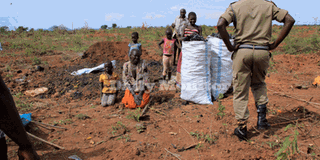Security forces aiding charcoal trade - Report

Police intercept an elderly woman burning charcoal in Kiura Forest Reserve in Kayunga District in 2019. PHOTO/RACHEL MABALA
What you need to know:
- Charcoal-related forest degradation threatens rural livelihood and destroys precious habitat for wildlife.
A new research report has pinned security forces for aiding illicit charcoal trade in the East African region.
In Uganda, the report points accusing fingers at the army, police and environmental protection police unit for aiding loggers and charcoal burners engaged in illicit charcoal business.
It also identifies weak laws and poor implementations, corruption by enforcement agencies and other anomalies in regulating commercial charcoal trade.
“The system generates corruption and criminality, at times even violence. These effects are largely the result of the failure to effectively implement existing regulations, sustainably manage forest resources and deploy alternative energy solutions,” the report that was released by Global Witness on Friday indicates.
According to the findings, charcoal harvesting is a significant cause of forest degradation in many parts of the region and that Uganda loses 72,000 hectares of the country’s forest cover each year resulting from harvesting firewood and charcoal.
The report further says charcoal-related forest degradation threatens other aspects of rural livelihood and also destroys precious habitat for wildlife.
Majority of Ugandans use forest products for cooking, with electricity connectivity standing at only 27 per cent. This puts a huge demand of forest products to meet the energy needs.
“Charcoal is sold nationwide in every other city, town and also at a lower rate in other locations,” the report says.
Criminal links
The report says while the analysis does not reveal a large organised crime problem, it shows a grey market in which poor, ineffective or inappropriate regulation gives rise to all forms of organised crime. It also says while laws or regulations are flouted at some point in the value chain, the final sale of the charcoal is not illegal.
“Many countries have regulations that specifically address the production of charcoal. Such laws seek to keep environmental degradation through deforestation to a minimum while allowing production to take place. However, due to weak enforcement capacity, such laws often exist in word but not in deed,” the report says.
The report points out to payment of bribes to police to avoid scrutiny of charcoal licences while influential charcoal dealers enter arrangements with government officials to ‘protect’ their business interests.

An unidentified man burns charcoal at Kakonwa Central Forest Reserve, Buvuma Islands, on October 29, 2018. PHOTO/FILE
It also says officials in district local councils receive bribes from producers and dealers to irregularly issue permits.
“Corruption at this level has also undermined efforts to introduce stricter legislation in rural areas. For example, in 2016, district local governments in West Nile and Acholi sub-regions began discussions about regulating the charcoal trade by formulating ordinances. Dealers in Kampala reportedly swung these procedures in their favour by establishing local trade organisations that lobbied the districts for changes that would ensure that charcoal is still transported to Kampala,” the report says.
The findings also indicate that dealers with political protection have also been able to use their contacts to secure industrial charcoal contracts.
“Between 2015 and 2018, some charcoal cartels counted among their members the then Minister for Justice and Constitutional Affairs, two senior army commanders and an assistant commissioner of the Uganda Police Force. These groups obtained a monopoly on the supply of charcoal to factories in Jinja District, where businesses used it to process vegetable oil and smelt iron, and other factories in Kampala and nearby Wakiso District...,’’ it says.
The army has been implicated in both logging and charcoal crimes in public forests, particularly in the forests where they have been deployed to prevent environmental crime.
“In Uganda, the military has also been accused of assisting charcoal producers to gain access and conduct their activities in protected forests such as in Zoka Forest in Adjumani District. From 2005 until the present, Zoka Forest has witnessed heavy deployment of environmental police and military to protect the forest but logging still continues to date,” the report says.
The report further indicates that logging and charcoal burning took place in Mabira Forest between 2000 and 2014 despite the forest being protected by the military and Environmental Protection Police Unit.
Those implicated in the report and government agencies tasked with the responsibilities of protecting the forest cover are yet to respond to the report findings. Our repeated calls to the ministers for environment and agencies such as the National Forestry Authority and National Environmental Management Authority went unanswered. Both police and the army spokespersons also did not respond to our calls.
The figures...
Shs655b Monetary value: The report estimates the monetary value of charcoal trade in Kampala at $182million (Shs655 billion) annually. It also puts figure in Juba at $31 million (Shs108.6b) while that in Nairobi stands at $271 million (Shs981b). The report, however, did not capture the values from other towns mentioned.
Regional roles and flows
In 2018, Kenya banned charcoal burning, but the report says the country is still a charcoal producer and a major exporter to the Middle East.
Uganda, according to the report serves as a producer, consumer and regional transit country of charcoal and that much of its charcoal is transported to Kenya.
“Due to the Kenyan ban on charcoal production, it is often more desirable for transporters to carry Ugandan charcoal in Kenya as it is often accompanied by a certificate of origin, which serves as protection against confiscation and extortion,” it says.
The report identifies West Nile and Acholi sub-regions as the main sites of production in Uganda.




